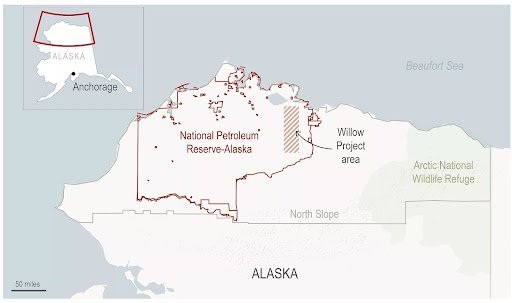What Does the Future Hold After Biden’s Administration Approved the Willow Project?
On Friday, March 3, people gathered in Lafayette Square outside the White House demanding President Joe Biden to not approve the Willow project in Alaska. Photo courtesy of Survival Media Agency
For years, ConocoPhillips, an energy company based out of Houston, has had its eye on Alaska for oil drilling. Finally on March 13, the Biden administration greenlit the controversial “Willow project” in Alaska that will allow drilling for oil and gas at three sites for multiple decades. The extraction of oil and gas will take place on a 23 million-acre National Petroleum Reserve in the North Slope of Alaska, which is owned by the federal government and is the largest tract of undisturbed public land in the U.S. Per the Biden administration’s estimates, the project could generate enough oil to release 9.2 million metric tons of carbon pollution each year, which is equivalent to adding 2 million gas-powered cars to roads. The Bureau of Land Management officially approved the project and will allow three drill sites including up to 199 total wells.
A map of the National Petroleum Reserve-Alaska. Source: AP Photo
The Willow project’s approval has stirred immense amounts of backlash from political officials, environmental activists, and everyone in between. The obvious damage that will take place on some of Alaska’s last untouched pieces of land has left many questioning what changed in the Biden administration’s stance on drilling. President Biden made a multitude of declarations during his campaign establishing “fighting climate change” as a central pillar for his presidency and made more promises to protect the environment than any other U.S president. In February of 2020, Biden stood with confidence at a town-hall meeting in Hudson, New Hampshire and said, “no more drilling on federal lands, period, period, period.” It was, he added, “a disaster” to drill for oil in the Arctic—“a big disaster, in my view.” Politico wrote that the Biden Administration’s decision to approve the Willow project is a direct result of the “Biden-moves-to-the-center” strategy, which will attempt to merge the gap between progressives and moderates. However, environmentalists continue to press Biden’s administration to justify its change in stance. Anti-Willow activists are reminding the President of his promises, saying that the approval of the project represents a deliberate betrayal after he promised to end drilling on federal lands during the 2020 campaign. Six environmental groups filed lawsuits against the Biden administration, and native Alaskans continue to speak out against the project. Environmentalists and land preservation activists have taken social media by storm and a reported 2.8 million signatures have been recorded on a Change.org petition to stop the Willow project. In early March, videos posted across TikTok with the hashtags #StopWillow and #StopTheWillowProject received hundreds of millions of views.
On March 19, the Intergovernmental Panel on Climate Change (IPCC), released its latest report warning that “the extent to which current and future generations will experience a hotter and different world depends on choices now and in the near-term,” which has bolstered the resistance movements against the Willow project. The Biden administration is being held accountable for the promises made to reform the environmental efforts of the U.S. Many believe that Biden approving the Willow project has put Alaska lawmakers against environmental groups and created division. Alaskan local politicians have stated their public support of the Willow project and how it will alleviate some of the energy needs of the Alaskan people.
In an Op-Ed published in CNN, U.S. Senators Lisa Murkowski and Dan Sullivan, (R-AK), and U.S. Representative Mary Peltola (D-AK), the Alaska Congressional Delegation state, “We all recognize the need for cleaner energy, but there is a major gap between our capability to generate it and our daily needs.” Alaskan officials expressed their support for oil drilling in Alaska because the lifestyle demands fuel, and in rural parts of Alaska the gas can cost up to $18 a gallon. The Congressional Delegation representatives conclude their statement of support with, “We need affordable energy today, and we will need it well into the future. And both are reasons why Willow matters.” The benefits for the people in Alaska’s North Slope are calculated into the Biden administration’s decision to approve Willow, however, the main catalyst is the country’s desperation for oil.
The Willow project continues to be reformed, and Biden has expressed that the administration is meticulously planning the project to minimize damage and deliver immense benefits. Supporters of the project treat it like an economic miracle, and ConocoPhillips has reported an estimate of 2,500 jobs will be created in construction and billions of dollars in royalties and tax revenues will be generated for the federal, state, and local governments. However, Alaskan activists and environmentalists continue to speak out against the project and express their fear for the future of our environment. These activists continue to fight to protect the home of the Teshekpuk caribou herd, polar bears, migratory birds and more that call this Arctic tundra home. This land is home to a fragile ecosystem, and conservationists say that it is imperative that this Alaskan land is protected. Wendy Wendlandt, president of Environment America said to EuroNews, "The Arctic is already warming faster than anywhere else on the planet, and the Willow Project would be a carbon bomb.”


